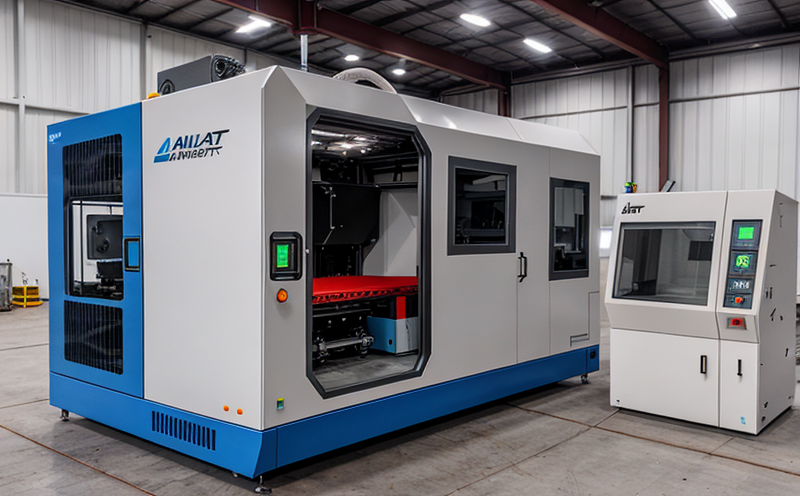ISO 52909 Fatigue Testing of Additively Manufactured Parts
The ISO 52909 standard is pivotal in ensuring that additively manufactured parts meet the stringent fatigue life requirements necessary for industrial applications. This testing method evaluates how components withstand repeated loading and unloading cycles, which are common in many manufacturing processes. Understanding the fatigue behavior of these parts is crucial to avoid failures in critical sectors like automotive, aerospace, and medical devices.
The additive manufacturing (AM) process introduces unique challenges not present in traditional machining methods. The complex geometries and microstructures inherent in AM parts can significantly alter their mechanical properties compared to conventionally manufactured counterparts. ISO 52909 addresses these differences by providing guidelines tailored for the specific needs of AM materials, such as stainless steel alloys, titanium alloys, cobalt-chromium alloys, and nickel-based superalloys.
The testing process involves several critical steps: specimen preparation, loading configuration, and fatigue analysis. Specimens are carefully prepared to replicate real-world stress conditions, ensuring accurate results that reflect the part's actual performance. The loading configurations can vary widely depending on the application, from simple tension-compression cycles to more complex multi-axial loading scenarios.
Accurate measurement of the number of cycles-to-failure is essential for assessing the fatigue life of a component. This requires precise instrumentation capable of high-resolution strain and displacement measurements. Additionally, non-destructive testing (NDT) methods such as ultrasonic testing or radiography can be employed to monitor internal defects that may contribute to premature failure.
Once the test is complete, detailed reports are generated outlining the fatigue behavior of the part under various loading conditions. These reports include graphical representations of stress-strain relationships and cycle-to-failure data, providing valuable insights into the part's performance. Compliance with ISO 52909 ensures that manufacturers can confidently use AM parts in applications where reliability is paramount.
The standard also emphasizes the importance of process control and quality assurance throughout the manufacturing process. By adhering to these guidelines, industrial manufacturers can ensure that their additively manufactured products meet not only fatigue life requirements but also other critical performance metrics such as dimensional accuracy and surface finish.
Why It Matters
Fatigue testing is essential for ensuring the long-term reliability of parts made through additive manufacturing. In industries like aerospace, where components must withstand extreme environmental conditions, even small cracks or imperfections can have catastrophic consequences. By conducting ISO 52909-compliant fatigue tests, manufacturers can identify potential weaknesses early in the design and production process, allowing for timely corrections before the products are deployed.
The results of these tests play a crucial role in maintaining regulatory compliance with standards such as AS9100 for aerospace applications or ISO/TS 16949 for automotive parts. Meeting these standards not only enhances the reputation of the manufacturer but also ensures that the products meet the stringent quality expectations set by end-users.
Moreover, fatigue testing helps in optimizing manufacturing processes. By analyzing how different parameters such as laser power, scan speed, and layer thickness affect the fatigue life, manufacturers can fine-tune their AM processes to produce parts with optimal performance characteristics. This leads to cost savings through reduced scrap rates and improved production efficiency.
In summary, ISO 52909 fatigue testing is a vital tool for ensuring the reliability and safety of additively manufactured parts across various industries. It provides critical data that manufacturers can use to improve product quality, enhance customer satisfaction, and maintain regulatory compliance.
Industry Applications
Automotive: Ensuring durability in high-stress components like engine pistons or transmission gears.
- Aerospace: Testing turbine blades and structural components for long-term reliability.
- Medical Devices: Evaluating the fatigue life of implants to ensure patient safety.
| Industry | Description |
|---|---|
| Aerospace | Turbine blades, structural components for long-term reliability |
| Automotive | Engine pistons, transmission gears for durability in high-stress components |
| Medical Devices | Evaluating the fatigue life of implants to ensure patient safety |
The results from ISO 52909 compliance are instrumental in reducing product failure rates, ensuring regulatory compliance, and enhancing brand reputation. This is particularly important for industries where component failures can lead to significant financial losses or even life-threatening situations.
Eurolab Advantages
At Eurolab, we offer comprehensive ISO 52909 fatigue testing services tailored to the unique needs of additively manufactured parts. Our state-of-the-art facilities and experienced team ensure that every test is conducted with precision and accuracy.
- Comprehensive Expertise: Our engineers have extensive experience in additive manufacturing and materials science, allowing us to provide expert guidance throughout the testing process.
- Advanced Testing Equipment: We utilize high-precision fatigue testers capable of simulating real-world loading conditions with minimal error.
- Comprehensive Reporting: Our reports are detailed and comprehensive, providing a clear picture of the part's performance under various stress conditions.
- Compliance Assurance: We ensure that all tests comply with international standards such as ISO 52909, AS9100, ISO/TS 16949, and others relevant to your industry.
By partnering with Eurolab, you can rest assured that your additively manufactured parts will meet the highest quality standards. Our commitment to excellence ensures that you receive accurate, reliable results that you can trust.





